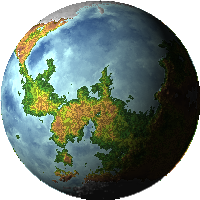Kirkcud III
| Name | Kirkcud III |
|---|---|

| |
| Sub-Sector | Secundus |
| Type | Civilised World |
| Population | 500 million |
| Climate | Temperate |
| Status | Imperial |
“I did not believe it possible that one single planet could contain such an inestimable volume of damp. The trees are damp. The houses are damp. My shoes – rated as one hundred per cent hydrophobic by the Magos herself – are damp, and may never dry. The people are charming and the forests picturesque, if viewed from a sealed and climate-controlled shuttle, but the endless rains and mists quickly take their toll on one’s good humour…” – Travel Diary of Lucius di Firro, 553.M41
About Kirkcud III
A temperate world with a pleasant climate and large habitable landmasses, Kirkcud III shows evidence of extensive terraforming completed long before Warmaster Ulian pacified the world in the early 320s. With calm weather, fertile oceans and small but respectable mineral deposits under the polar caps, Kirkcud III should be a colonist’s dream; and indeed, significant colonisation in the late 300s led to the establishment of several large settlements in the southern lowlands and coastal deltas of the western continent, bringing industry, factorum complexes, a large orbital starport and a wealth of Imperial facilities for the native population.
The inhabitants of Kirkcud III, however, were less than thrilled at the sudden arrival of the Imperial bureaucratic machine in their idyllic home. While colonist families report the locals as friendly, curious and helpful, and many have intermarried, the Administratum census and taxation agents sent to bring the world to full administrative compliance characterise their work as “frustrating”, “fruitless” and “lethally difficult”. The locals simply fail to understand or accept why they should pay taxes for occupying land their families have farmed and mined since millennia before Durovera‘s Crusade entered the Sector.
The planetary government, under strict tithes to the Sector and with no way of raising funds except rigorous taxation, has no choice but to deploy census-takers and revenue adepts with increasingly heavy PDF escorts – angering colonist and local alike, and driving yet more youths into the hands of a fledgling planetary resistance movement. Among the exacerbating factors is a persistent local superstition that the incidence of Psyker births in the population, once a near-vanishing rarity, has increased dramatically since Imperial colonisation began. The planetary government dismisses this as statistically unfounded and theologically improbable, but the heretical supposition quietly persists unchecked.
The rebels have so far committed no particularly spectacular affronts to Imperial dignity; a few freight speeders overturned, the odd shuttleport riot and a great deal of petty theft and vandalism which the Arbites scornfully classify as “criminal” rather than “rebellious”. However, with no sign of capitulation or compromise from either side, and the Eastern continent providing a perfect hiding-place for any number of wayward insurgents, the unrest seems destined to rumble quietly on for generations to come.
Both major continents are inhabited, though population density on the moorland and low-lying plains of the western continent, Domfir, is substantially higher than on Gallao, the more rugged and rain-soaked eastern continent. Gallao is almost totally covered in dense coniferous forests, with the local quick-growing evergreen trees providing a seemingly endless source of timber and pulp for the subsector’s sawmills and factories. Great mechanised logging camps have made inroads into the “wildwood”, as the locals call it, creating scars in the tree cover visible from orbit, but even at current logging rates it would take several centuries before the forestry had any real impact on the landscape.
Kirkcud has a near-Terran orbital cycle, with planetary years lasting three hundred and sixty-one days; there is some geological evidence which suggests this was not always the case, and the Sector geological survey has an extant petition for funding to investigate tectonic evidence under the polar oceans which they believe point to a cataclysmic event at some point in the planet’s past – a “happy accident” which turned it from a frozen wasteland closer to the orbit of barren Kirkcud IV into the hospitable and temperate haven it is today.
The planetary government is founded on a Parliamentary council, with each hundred thousand freeholders and citizens entitled to elect a representative who speaks on their behalf to advise the Imperial Governor. In reality, the extent to which the Imperial Governor listens to these “advisors” is severely limited, and the system is widely seen as a sham to placate the conservative locals by replicating their traditional form of government. The current Imperial Governor, Aiofe mac Sachairi, is a House Roshan-Fikran scholarship girl, born on Kirkcud but only recently returned to the planet after spending three decades at the finest Scholae and Academies the Sector can offer. The locals see her as an overeducated quisling with pockets full of Imperial thrones, and the Administratum see her as altogether too sympathetic to the insubordinate natives.
Recent History
During the Silence, a contingent of Regency forces were able to strike behind Imperial lines, bypassing the Cerastes Salient blockade at Helaerus and making planetfall on Kirckud. The 1061st Composite (Abhuman) Auxilia, stationed on-world for training exercises, became heavily embroiled in a rapidly-evolving guerilla conflict in the Wildwood of the Eastern continent and were functionally destroyed suppressing the Sovereign Order’s deepstrike. The affair might have been embarrassing for the Salient’s commander, General Astara, had anything more relevant than abhumans been lost. More widespread disruption was prevented in no small part due to tactical flexibility on the part of General Mhairi Ni Crol in leadership of the continent's PDF, as well as emphatic action by Imperial authorities under Governor Aoife mac Sachairi to suppress the Rising Flame and other dissidents.
